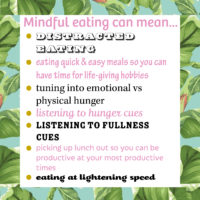The eating basics (things to establish before diving into Intuitive Eating).
Knowing how to eat is useful before jumping into Intuitive Eating. When working with clients who don’t have an eating disorder, it takes 3 sessions to cover nutrition basics and then create an individualized plan for moving forward. If one is preoccupied with food, the below is a path that (over time) will reduce food obsession. If concerned about the body changes that may come with changing how you eat, that’s to be expected. Here’s what is helpful to know:

The basics:
1) Meals need a source of protein, carbs, fat, dairy & fiber (fiber = fruit, vegetable, or whole grain). This is *most* of the time, not always and no matter what.
2) Don’t separate sugar from carbs. There are only carbohydrates. Sugar is not a separate macronutrient from a carbohydrate. Sugar is a type of carbohydrate, a simple carbohydrate. There are simple carbs and complex carbs, but that is a gentle nutrition concept that one may (or may not) choose to explore after a healthy relationship (aka permission and ease around all foods) has been created.
3) Don’t label certain foods as desserts. All foods are either a source of protein, carb, fat, dairy, and/or fiber. This is a new language to use when thinking about food.
4) Eat 3 meals and 3 snacks each day.
Since this is the foundation of a healthy relationship with food, this is one component of how I’m teaching my kids to eat (also leaning into preferences and what foods taste good to them is prioritized too). Just last week a child was going for yet another gummy fruit snack packet and we had a conversation about how fruit snacks are only carbs. This accomplished talking about food neutrally without pathologizing it with extremes of sugar = bad. The conversation continued:
Me: “You are missing the other food groups. Fruit snacks are just carbs. To be full and satisfied you need all of the food groups. What is a food that has protein and fat?”
Child: “Okay. Ugh, fine. I’ll pick a cookie and a glass of milk.”
Me: “Great. The cookie has fat and carbs. The milk has protein.”
Child: “I didn’t know one food could have two things in it (re: cookie having fat and carbs).”
Me: Yep. *end conversation*
Food that is sweet is pleasant. One of my kids would nearly always pick a gummy fruit snacks pack over any other food. She was my colicky baby and her palette is still more selective, which I feel those two things are linked. She has strong opinions on what she likes and what she doesn’t and I love that about her…even when I lose it with impatience because it’s also annoying.
Instead of communicating that certain foods are good or bad, communicating that all food is protein, carbs, fat, dairy or fiber allows my kids to build the knowledge of how to feed themselves without a diet mindset of sugar-is-bad or thinking there are certain foods they need to avoid. We need it all. Back to the above example, did the child go back for another fruit snack after her cookie and milk? I actually don’t know. We don’t monitor it closely. They have access to all food all the time, and there are plenty of times I find multiple empty fruit snack wrappers and I tell the kids that I will stop buying these if their trash doesn’t get put in the trash can. But honestly, I need to stop with that threat because it’s not true that I plan to stop buying gummy fruit snacks.

Some other conversations around food lately:
With my nearly 6 year old I did have a conversation around processed food vs non-processed food. I forget how it came up, but she had been asking about foods from the earth or something like that. There are differences in food and how it makes us feel, but she is the lead scientist on how food makes her feel and I want to encourage her to continue to lean into that.
There was a situation of one kid ending up feeling sick after eating too much candy and it was a great learning moment for her. I met it with no shame, just: “aww man! Ouch!” Then: “Now we know! Let’s go take a rest and watch TV until you feel better.” Everyone learns best without shame in the equation, amiright?!
If I’m looking for it (and not focusing on how a kid just dramatically rejected the dinner I cooked), then I love how my kids are with food. One child always has snacks packed for everyone. I don’t even see her do it, but numerous times I’ve benefitted from her preparation. Another child will get *so* into a particular topic, currently dinosaurs, and will *mostly* only eat food that is appropriate for the current dinosaur of interest. “Mom, I’m a Velociraptor. They were a carnivore. Give me meat.” Or, other times, “Mom, I’m a Maiasaura. They’re a herbivore. I can’t eat meat!” What cool kids. I mean, they are seriously the coolest and most interesting and it just takes my breath away they are mine. And also, holy crap they are so annoying and I’m so tired lol. So. tired.
Circling back here…my constant messages are: you are in control of your body and have to communicate your needs. It’s your job to listen to your body and notice when you are hungry and when you are full and to communicate with WORDS what you need and TO NOT ATTEMPT TO COMMUNICATE IN (what I call) SCREAM GIRL/WHINE GIRL.” I tell my kids I do not speak the languages of Scream Girl or Whine Girl. How fast whining can drain my energy is a medical marvel. But if I am asking them to communicate in their words and not having it escalate to a scream/whine, then I have to respond to their words and they have to gain the capacity to wait more than 10 seconds for me to pour them a glass of milk. They scream/whine because they know it’s effective for getting my attention. Ay yi yi. Parenting it hard.
To summarize, there are limits set by me that my kids can not eat only one macronutrient all day long. If my kids have sources of protein, carbs, fat, fiber and dairy coming in on a weekly basis (yes, weekly, not daily), then we’re good. Food is so many things: Food is fun, food is playful, food is fuel, food is nourishment, food is necessary, food is tasty, food is pleasant. Here’s to keeping it that way!






Hi! I agree with much that you say. However, I read about a study that showed that people dont need to hit all the marks (macro) each DAY. In the study, they let kids eat whatever they wanted (intuitive, unrestricted), and it showed that they eat very balanced over the COURSE of several day. It evens out.
I agree! As said in the post: “If my kids have sources of protein, carbs, fat, fiber and dairy coming in on a weekly basis (yes, weekly, not daily), then we’re good.”
Yes, I believe they would meet all macronutrients over the course of a week+, regardless of me prompting at some meals for them to add another macronutrient. But I still like educating them around macronutrients so when diet culture comes for them I can have them as ready as possible to see the lies. There is already so much talk of the “perils of soda” that has come from school and we can talk and label it as just a carb source at home.
Love this! Thanks for sharing. Always look forward to reading your blogs. I think I will find them very helpful when we have kids. :)
This is such a helpful way to approach my very picky eater who is almost 5. Meals can get very repetitive around here for her, but at least she’s hitting all the macronutrients.
These picky eaters!! They are hard!
Hello! I love your outlook on nutrition and eating. I’m wondering what you recommend as a replacement for dairy for those are allergic to dairy. Do you just call it a “calcium-rich food” or something along those lines?
Yeah, that seems like a great substitute!
I love the way you write…it’s just so darn humorous to me! You need to write a book some day (when you have the time!) Love when you post Kylie!!!
Thanks, Cindy!
I’d love you to write more about how you approach IE with kids if you’re up for it (or design a course or something even – I would absolutely buy it!) The only materials I can ever find are division of responsibility related, which I think is super helpful, but I am hearing you approach some things a bit differently (like having them have access to all foods all the time.) If you’re willing to elaborate at some point I know I’d love to hear more!! I am not actually worried about what my kids end up eating (it really does seem to even out over time!), but I do sometimes struggle internally around “am I providing too much/not enough structure around food.”